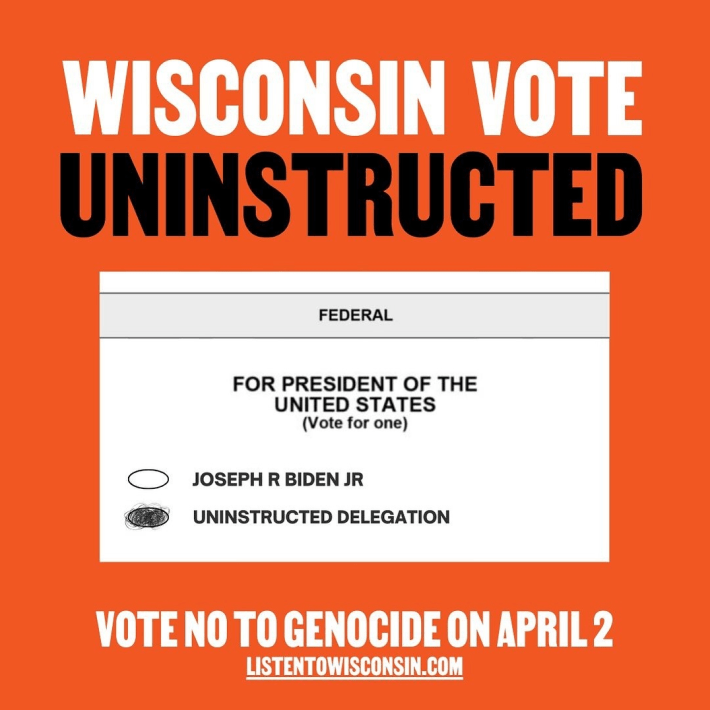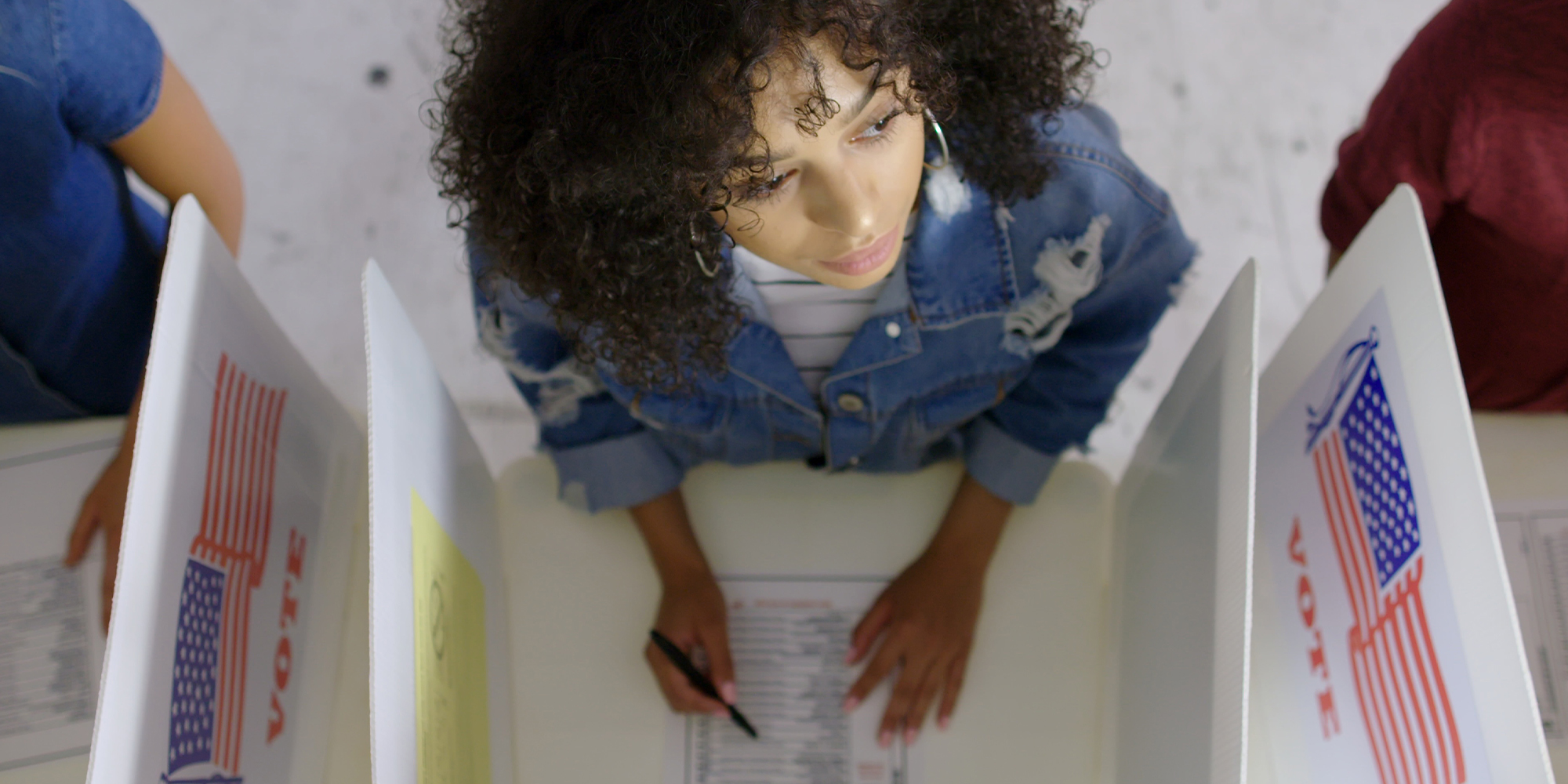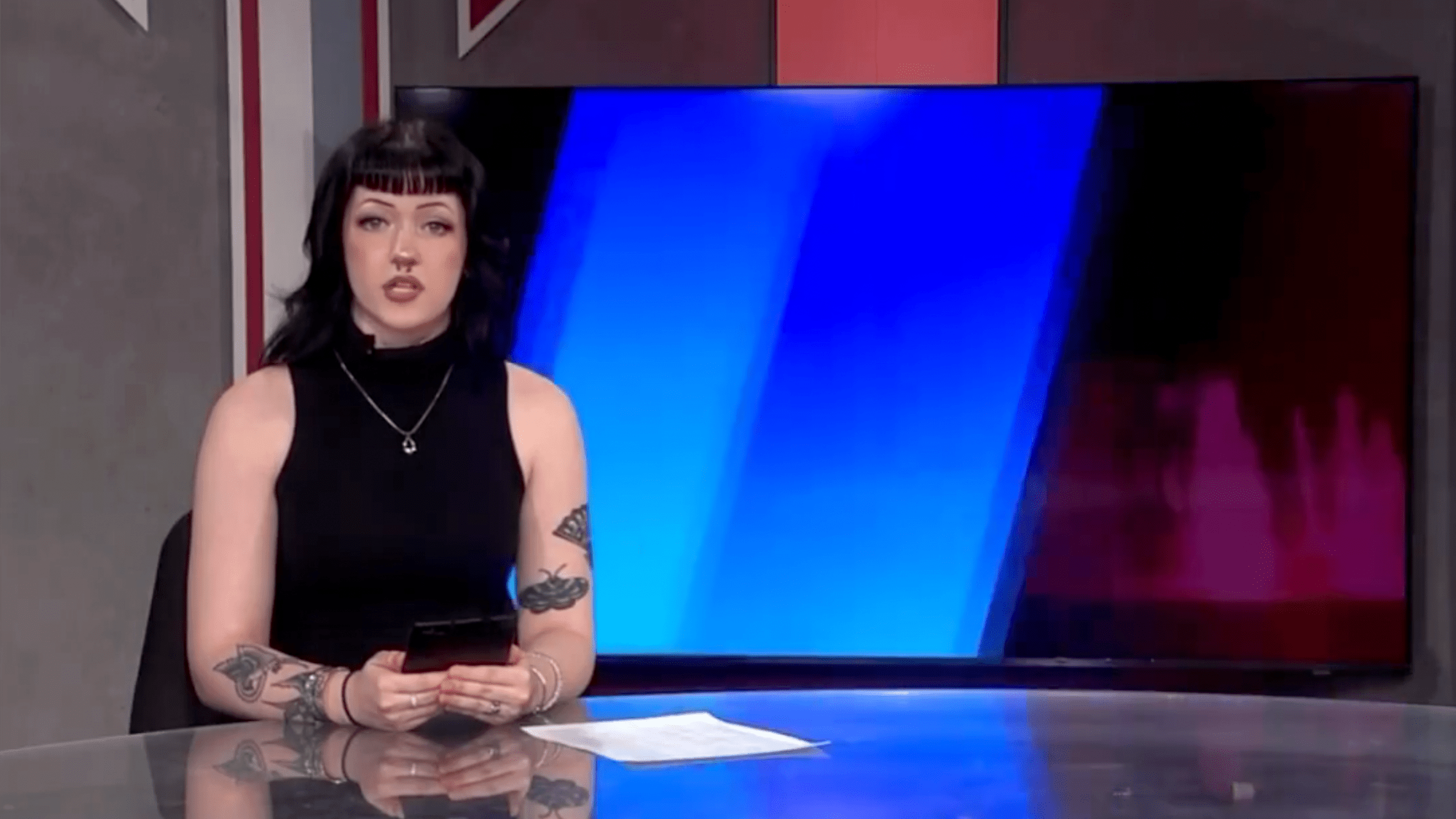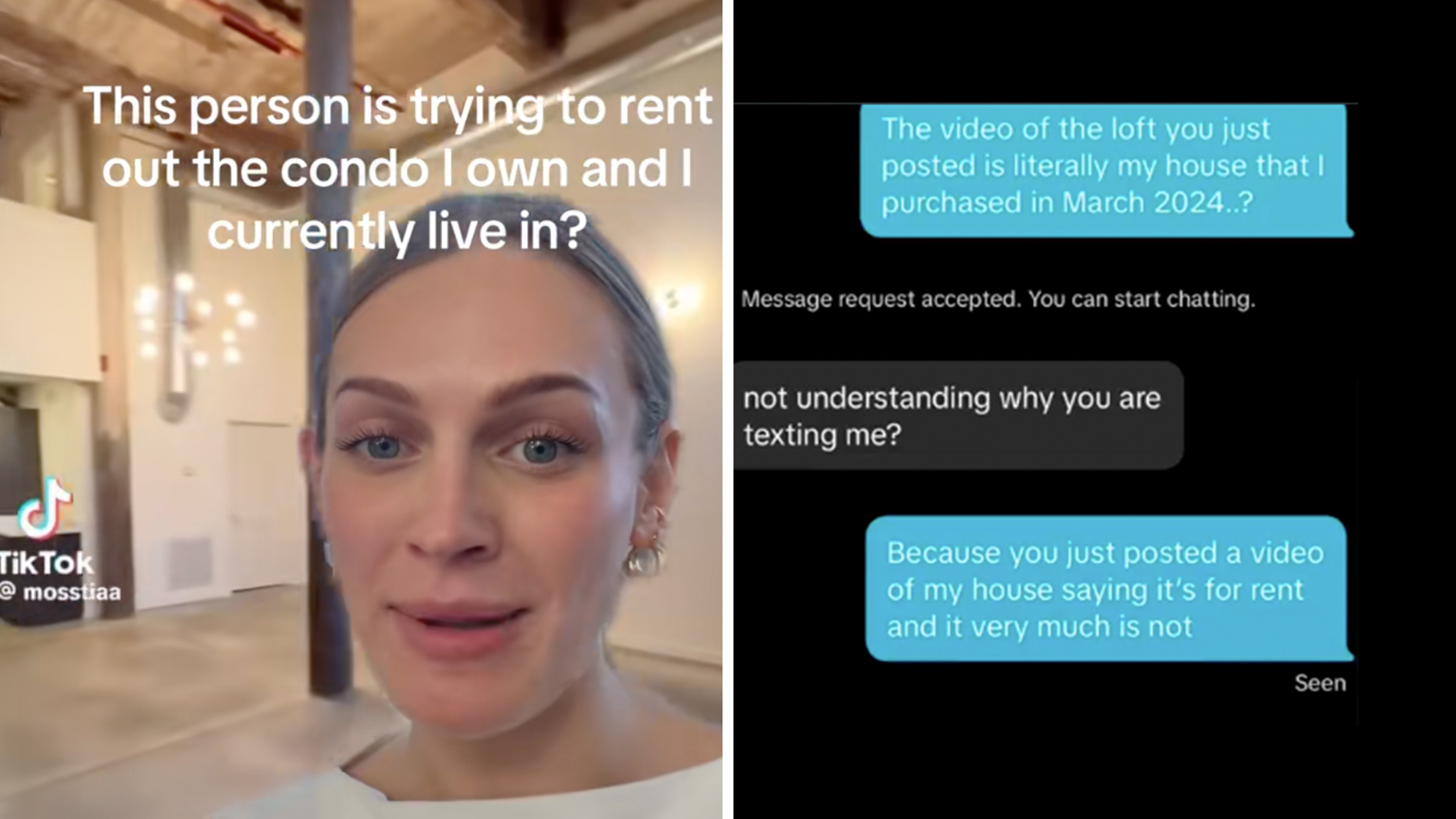The overall protest vote was higher than the “historical norm” of seven percent in state Democratic presidential primary elections, but President Joe Biden still won the Democratic nomination on March 12.
But that hasn’t stopped pro-Palestinian activists from continuing to organize protest vote campaigns in states with Democratic presidential primaries after Biden’s nomination win, like Missouri, New Jersey, Wisconsin, Oregon, and New York. Organizers say they’ll take all remaining opportunities to cast a protest vote in the Democratic primary.
Thus far, protest votes in the 2024 Democratic primaries have relied on individual state ballot systems. In states where ballots include write-in options, like New Hampshire, Washington, California, and Vermont, voters protested by writing in “ceasefire” as part of the “Vote Ceasefire” campaign.
In other states where ballots include an “uncommitted” option, organizers utilized it for their protest vote campaigns. Both Listen to Michigan, which got over 100,000 votes, and Uncommitted Minnesota, which got approximately 45,000 votes, were campaigns based on the “uncommitted” ballot option.
Overall, ten percent of Democratic voters voted “uncommitted” in their state’s Democratic presidential primary election as a way to protest Biden’s support for Israel in its war against Hamas. What’s more, that percentage doesn’t even include voters who wrote in “ceasefire” on their ballots.
The protest vote campaigns were motivated by Biden’s embrace of Israel following Hamas’s October 7, 2023 attack and the Biden Administration’s subsequent shipments of weapons to Israel. Since October 7, more than 30,000 Palestinians have been killed.
And the combined efforts of these campaigns seemed to reach the White House: After Michigan’s February 27 primary, Politico reported the Biden campaign was “freaking out.” A week later, Vice President Kamala Harris called for an “immediate ceasefire for at least six weeks” in a March 4 speech.
A campaign in Missouri followed Michigan and Minnesota’s lead: the Missouri Uncommitted Vote Movement connected with Missouri voters on Instagram to persuade them to choose “uncommitted” on their Democratic presidential primary ballots ahead of the state’s Democratic primary this past weekend.
Ana Anazco, one of Missouri Uncommitted Vote Movement’s lead organizers, told the Daily Dot the campaign stayed alive after Biden was named the Democratic nominee because they refused “to continue silent in light of the genocide.”
“We will continue to exercise our right of voting but will not commit to individuals or parties just because they seemed to be ‘the less evil’ option,” Anazco told the Daily Dot. In Biden’s rematch against former President Donald Trump, Biden is seen by some voters as “the lesser of two evils.”

The Missouri Uncommitted Vote Movement used hashtags like #SayNotoJoeinMO and #VoteNotoJoeinMOPrimary to rally Missouri voters, and the effort was supported by the St. Louis Palestine Solidarity Committee and the STLActivist community organization. The Missouri Uncommitted Vote Movement got almost twelve percent of the vote in the state’s primaries, picking up three delegates.
New Jersey also has its own uncommitted campaign ahead of its primary on June 4. Vote Uncommitted NJ has already made big strides: On March 25, the group announced on Instagram it had received enough signatures on its petitions in New Jersey delegate districts to get an “Uncommitted – Justice for Palestine” option on the state’s Democratic presidential primary ballots.
“Uncommitted NJ says justice for Palestine,” the campaign’s recently released slogan states. “Permanent ceasefire now.”
Listen to Wisconsin is similarly encouraging Wisconsin voters to vote “uninstructed” on their Democratic presidential primary ballots ahead of the state’s primary on April 2. Wisconsin presidential primary ballots include an “uninstructed” option, rather than “uncommitted.”
The campaign was borne out of a Wisconsin grassroots, multi-ethnic, and multi-racial community of activists that have been organizing on behalf of Palestine for months. And as Listen to Wisconsin’s name suggests, organizers were inspired by Listen to Michigan.
The campaign launched on March 19 and aims to garner 20,000 votes—approximately the amount of votes Biden won over former President Donald Trump in Wisconsin in the 2020 general election.
And if Listen to Wisconsin receives more than 15 percent of the Wisconsin vote, the campaign hopes to earn an uninstructed delegate who will represent them at the Democratic National Convention in Chicago in August. But Halah Ahmed, the campaign’s spokesperson, told the Daily Dot it’s about more than the number of “uninstructed” votes they get on April 2.
“Any number would be really significant to us,” Ahmed said. “We know it's really significant to voters, because they feel like ‘oh, my gosh, I actually have an opportunity to be heard again,’ when they have felt so disenfranchised and betrayed in grieving and protesting and emailing.”

On the West Coast, Oregon’s protest vote campaign is still taking shape ahead of its state Democratic presidential primary election on May 21.
In a phone interview with the Daily Dot, communications professional and pro-Palestine organizer Kai McMurtry said Oregon community organizations like the American Palestinian Council, the Jewish-Palestinian Alliance of Oregon, Progressive Democrats of America, Healthcare Workers for Palestine PDX, and others have recently come together to organize a protest vote similar to that of Vote Ceasefire campaigns.
McMurtry said he and his fellow organizers aren’t quite sure exactly how they’ll be utilizing the Oregon ballot, which does not include an “uncommitted” or “uninstructed” option. It does, however, have a write-in option and the campaign is currently figuring out if they will be able to get write-in “ceasefire” votes counted by the Oregon Secretary of State’s office.
“The short answer is Oregon will have on our democratic primary ballot for President Joe Biden, Marianne Williamson, and write-in line. Those are the only three options,” McMurtry told the Daily Dot. “How the Secretary of State's office will treat write-ins is what remains unclear, because we haven't really been in a situation like this before.”
As for why he and other Oregon organizers continue to campaign for a protest vote in their state, McMurtry expressed a sentiment similar to that of Vote Ceasefire organizers in New Hampshire and Washington: The Democratic Party is concerned about votes, so protest votes are a way to get it to listen to Democratic constituents. And more protest votes might get the Party’s attention after Biden won its nomination.
“In a moment of urgency that is nearly unprecedented—if not entirely unprecedented—such as this,” McMurtry said, “any tactic that seems to exercise leverage to convey to the administration… the urgent priority of Oregon voters seemed ripe for consideration and pursuit.”
New York voters who want to cast their Democratic presidential primary vote in opposition to Biden are taking “any tactic” quite literally: Because New York ballots don’t offer write-in or “uncommitted” options, Leave It Blank NY is asking New York voters to show up to the polls and not vote for anyone for the Democratic nomination.
Blank or void votes are counted in New York state, though they won’t be made public until weeks after the state’s primary elections on April 2. Leave It Blank NY was started by Hesham El-Meligy and Brittany Ramos DeBarros, two New York City Democrats, and is supported by the NY Muslim Action Network, Jewish Voice for Peace Action, and a host of local New York state progressive organizations.
“We think voting blank is the most powerful way we use our ballots to make a statement together,” the campaign stated on its website. “This is a chance to show how many voters in New York and nationwide care about Palestine and want a cease fire specifically.”
Protest vote campaigns across the nation have exceeded organizers’ expectations, especially those of Rachel Rybaczuk, who organized the first protest vote in New Hampshire and is now Vote Ceasefire’s National Campaign Director.
“It’s been incredible to see the spread of an idea we organized quickly on a shoestring budget,” Rybaczuk said. “We would not have guessed our efforts would generate email inquiries from voters all over the country.”
And even though Rybaczuk acknowledges many states have approached the protest vote differently than Vote Ceasefire, their efforts are “a clear indication that there is a national movement demanding a permanent and meaningful ceasefire.”
This post has been updated with the Missouri primary results.
The internet is chaotic—but we’ll break it down for you in one daily email. Sign up for the Daily Dot’s web_crawlr newsletter here to get the best (and worst) of the internet straight into your inbox.






